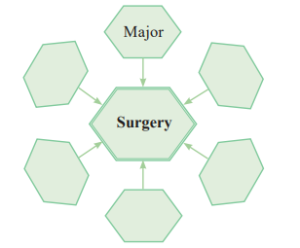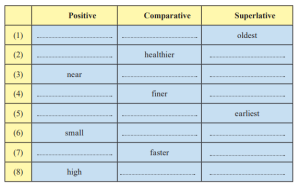Revolutionary Steps in Surgery
English Workshop
1. Read the lesson and name the following.
Answer:
(a) The first surgeon to perform operations: Sushruta
(b) Anaesthetics used from mid 19th century: Ether or chloroform
(c) The first successful Cardiac Surgeon: Daniel Hale Williams
(d) A sack around the heart: Pericardium
(e) The father of modern neurosurgery: Harvey Cushing
(f) The world’s most advanced surgical robot: Da Vinci
2. Match the terms in ‘A’ with their explanation in ‘B’.
‘A’ ‘B’
(1) tooth- extraction (a) a cut made for surgery
(2) cardiac (b) having length, breadth and depth
(3) sedative (c) plastic surgery
(4) tumour (d) related to the heart
(5) incision (e) a control unit for a robotic surgery
(6) a console (f) removing a decayed tooth
(7) 3-D (g) substance that makes a person sleep
(8) Cushing clip (h) an extra growth in the body
(i) a device to stop blood loss in neurosurgery
Answer:
(1) tooth-extraction – (f) removing a decayed tooth
(2) cardiac – (d) related to the heart
(3) sedative – (g) substance that makes a person sleep
(4) tumour – (h) an extra growth in the body
(5) incision – (a) a cut made for surgery
(6) a console – (e) a control unit for a robotic surgery
(7) 3-D – (b) having length, breadth and depth
(8) Cushing clip – (i) a device to stop blood loss in neurosurgery
3. Fill in the web with words related to ‘Surgery’.
Answer:
- Major
- Minor
- Operation
- Procedure
- Medical
- Recovery
4. Write 3 to 4 lines about each of the following in your own words.
(a) ‘Sushruta Samhita’ ……………
Answer: ‘Sushruta Samhita’: The ‘Sushruta Samhita’ is an ancient text from around 600 BC that focuses on surgery. It was written by Sushruta, who is believed to be the first surgeon to perform operations, particularly in plastic surgery. This work is one of the earliest records of surgical practices in the world.
(b) First Cardiac Surgery ……………
Answer: First Cardiac Surgery: The first successful cardiac surgery was performed by Daniel Hale Williams in 1893. He operated on a patient named James Cornish, who had a knife wound near his heart, and repaired the damaged artery and pericardium. This daring operation marked a major milestone in heart surgery history.
(c) First Neurosurgeon ……………
Answer: First Neurosurgeon: Harvey Cushing, known as the father of modern neurosurgery, developed key techniques and tools for brain surgery in the early 1900s. He reduced the death rate in neurosurgery from 90% to under 10% by inventing the ‘Cushing clip’ to control blood loss. His work made neurosurgery a recognized medical field.
(d) The Robotic Surgery ………….
Answer: The Robotic Surgery: Robotic surgery uses advanced robots like the Da Vinci to perform minimally invasive operations. Surgeons control tiny instruments and a 3-D camera through a console, allowing precise movements through small incisions. This technology improves accuracy and helps patients recover faster compared to traditional open surgery.
5. (A) Fill in the gaps in the table of Degrees of Comparison.
Answer:
| Positive | Comparative | Superlative |
|---|---|---|
| old | older | oldest |
| healthy | healthier | healthiest |
| near | nearer | nearest |
| fine | finer | finest |
| early | earlier | earliest |
| small | smaller | smallest |
| fast | faster | fastest |
| high | higher | highest |
(B) Adjectives that have more than two syllables (long words) take ‘more’ and ‘most’ before them to form Comparative and Superlative degrees.
For example: successful – Positive Degree
more successful – Comparative Degree
most successful – Superlative Degree
- Give the Comparative and Superlative forms of –
Positive Comparative Superlative
(1) ancient ………………………… ………………………….
(2) special ………………………… ………………………….
(3) significant ………………………… ………………………….
(4) advanced ………………………… …………………………
Answer:
| Positive | Comparative | Superlative |
|---|---|---|
| (1) ancient | more ancient | most ancient |
| (2) special | more special | most special |
| (3) significant | more significant | most significant |
| (4) advanced | more advanced | most advanced |
| (5) accurate | more accurate | most accurate |
6. Join the sentences using appropriate Co-ordinators. (but, or, so, and)
(a) There was lack of technology. Major surgery could not develop for centuries.
Answer: (a) There was a lack of technology, so major surgery could not develop for centuries.
(b) Cardiac Surgery was tried in the past. Patients did not survive.
Answer: (b) Cardiac surgery was tried in the past, but patients did not survive.
(c) He places his fingers into the master controls. He operates all four arms of the Da vinci.
Answer: (c) He places his fingers into the master controls, and he operates all four arms of the Da Vinci.
(d) Open heart surgery can help to repair heart valves. It can also replce them.
Answer: (d) Open heart surgery can help to repair heart valves, or it can also replace them.
(e) Heart patients were treated with sedatives. They did not survive.
Answer: (e) Heart patients were treated with sedatives, but they did not survive.
(f) These procedures can be performed through very small incisions. Our patients experience a number of benefits.
Answer: (f) These procedures can be performed through very small incisions, so our patients experience a number of benefits.
7. Write in your notebook an imaginary telephonic conversation between you and your family doctor’s secretary, asking for an appointment to consult the doctor for a health problem you are suffering from. Begin with ……….
Secretary: Good morning ! This is XYZ Clinic.
How can I help you?
Myself: Good morning! I am ……………………………………..
(Now continue……)
Answer:
Secretary: Good morning! This is XYZ Clinic. How can I help you?
Myself: Good morning! I am Priya Sharma. I’d like to book an appointment with Dr. Patel for a health issue I’ve been having. I’ve been feeling a sharp pain in my stomach for two days now.
Secretary: I’m sorry to hear that, Priya. Let me check Dr. Patel’s schedule. Could you please tell me if you’re available tomorrow morning at 10 AM?
Myself: Yes, that works for me. Thank you!
Secretary: Great, I’ve booked you for 10 AM tomorrow. Please arrive 10 minutes early to fill out some paperwork. Feel better soon!
Myself: Thank you so much! Have a good day!
Secretary: You too! Goodbye.



Leave a Reply